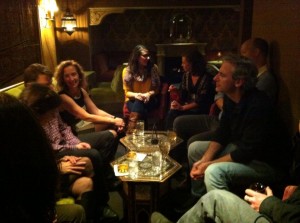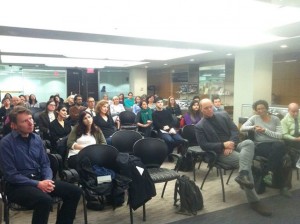Think of our life in nature —
daily to be shown matter,
to come in contact with it —
rocks, trees, wind on our cheeks!
the solid earth! the actual world!
the common sense! —
Contact! Contact!
Who are we? where are we?
Thoreau on Katahdin (thanks to Lowell Duckert)
What happens when things come together? On this lovely fall Saturday, the last day of soccer season, back home now in CT after an amazing two days in DC, I can think of a few things. Low on sleep I offer fragments —
Bristles that stick: Tim Morton’s keynote yesterday afternoon scratched us with “bristles” — sticky, burr-y things, pointing out from bodies and entangling with other bristly things — as a kind of reconfiguration or recapitulation of his OOO conceptions of withdrawal and entanglement. It made a bumpy, tactile way of entangling human and nonhuman bodies. It was great to hear how much of his analysis flows out of classical paradoxes in logic — the liar sentence, the Sirotes paradox, Cantor sets, etc. Tim also was wonderfully generous in the Q&A & dinner/bar chat also — really terrific to meet him in person.
An archive of skin: One of Bruce Holsinger’s exciting forthcoming publications is A Burnable Book, his novel about Chaucer and Gower novel, but his talk was about a different book on the parchment archive. He helped us see whole, or at least imagine, the massively dispersed fragments of animal hides that have been scraped, tanned, marked, and preserved. He talked about geneticists who are using this archive to code the genome of pre-industrial sheep and cattle in Europe. We all talked about a probably apocryphal story about the Vatican archives, full of parchment, smelling like a stable. I’ve been mulling all day what Kellie Robertson quipped as Big Sheep — a digital archive, searchable and sliceable, of the skin archive of parchment. Is it just that when we see the skin-pieces we want some way to make them whole bodies?
William’s “nothing”: The best new poem I heard yesterday was William of Acquitaine’s troubadour lyric about the pleasures of absence:
I’ll write a verse about nothing at all,
it isn’t about me or about anybody else,
it isn’t about love nor about youth,
nor about anything else,
because, in the first place, it was conceived while sleeping
on a horse
Anne Harris’s great, resonant, echo-filled meditation on Ovid, Michel Serres, William of Acquitaine, and the imaginative project of seeking a silence prior to or untroubled by language, a noise without signal which cannot be read (or misread), followed Bruce’s skin-ful call to move from words to feelings.
First he was a bat: One of the real pleasures of Contact Ecologies for me was the chance to present in a two-paper mini-panel with a friend from grad school, Kellie Robertson. She was a few years ahead of me in the program, and had left for midwestern pastures by the time I finished. In the intervening decade-plus we’ve seen each other a few times at MLA or the Folger, but not often have had time to visit, and never before to work together. Her talked started with a controversial new book by Thomas Nagel, who once speculated about what it would be like to be a bat, attacking the neo-Darwinian materialist consensus. Via her recent work on medieval Aristotelianism, she helped us imagine an alternative history of science, in which teleology and form might not be forbidden words, and chance not a supreme value. It’s hard to imagine this path — which is her point — but wonderfully challenging to think along it. She started with an oddly matter-of-fact poem by Walter de Maria about loving natural disasters and then talked about his lightning field installation in New Mexico. Kellie didn’t quite argue for a new Aristotelian turn, but she did persuasively suggest that the blinders of centuries of post-Cartesian anti-Aristotelianism might be worth pulling off, to see what else is out there.
My ‘cene-salad and Mandelshtam’s “Horseshoe”: I posted short versions of my talk on Facebook before heading south on Thursday. In four words: Anthropocene? Homogenocene! Thalassocene? Naufragocene! Two words: theft? composture! In one: turbulence!
There was a bit more to it, and maybe I’ll post a little of it here later, but one fun part was swapping out a clear-sounding name for four overlapping terms. At least some of the problems I tend to have with too-narrow terminology might be avoided — or such is my gamble — by multiplying terms, so that rather than marking single imperial claims, each name and every historical meta-narrative gets composted along side another.
Another fun part was introducing a few lines from one of my favorite modern sea poems, Osip Mandelshtam’s “Whoever finds a horseshoe.” I used Mandelshtam’s poem to introduce wily Ulysses, hero of the Naufragocene, Age of Shipwrecks —
But breathing the smell
Of resinous tears oozing through planks
Admiring the boards of bulkheads riveted
Not by the peaceful Bethlehem carpenters but by that other —
Father of journeys, friend of seafarers —
It’s not only a sea poem but a lament about the human shipwreck of Soviet history and a lyric dream of absolute form. “Time pares me down like a coin,” it ends, “And there is no longer enough of me for myself.” I love the James Greene translations that Alinor gave me before we got married — in fact one of his other great maritime poems, “Sleeplessness. Homer. Taut sails” was part of our wedding in Sausalito in 1996. I’m really pleased that in this talk, and eventually in my book on shipwreck, I’ll introduce Odysseus, a figure who saturates the book and my thinking, via Mandelshtam.
Public Joy: Thursday afternoon a slightly different configuration of us took in Eileen Joy’s utopian torrent of invention and possibility. Faced with a crisis in scholarly publishing and finding adequate publics for our work, she insists that we invent them. Time wears down all things (like coins, and sometimes because of what coins represent), but it’s hard not to be a little bit optimistic about the future of the humanities when you’re in the middle of events like these.
Contact Ecologies was the latest in a series of MEMSI fantasias that I’ve joined, as participant or audience member or lurking twitterbot. Eileen’s talk especially but really the whole event drove home to me a key reason why we need these events. They are themselves acts of publishing, of making public and publics and communities.
Tim Morton has already said over on his blog pretty much what I think about Jeffrey Cohen’s wizardly hosting. It’s such a pleasure to play with such smart people in their messy, constructive, play-ful, vibrant sandbox.


[…] class, picking up the kids from school, even while I was attending and speaking at the fantastic Contact Ecologies symposium in DC. It fits nicely in my pocket. A little bigger than my iphone, but lighter and more […]